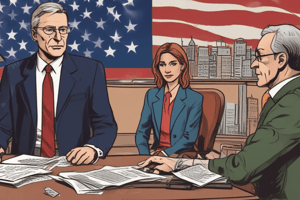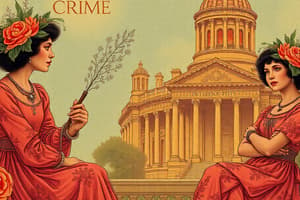Podcast
Questions and Answers
What is the definition of violent crime?
What is the definition of violent crime?
- A crime that results in non-physical harm.
- A crime involving financial fraud.
- A crime where someone uses or threatens force. (correct)
- A crime that involves drug possession.
What does crime mapping refer to?
What does crime mapping refer to?
- Publishing annual crime statistics.
- The act of mapping historical events related to crime.
- Identifying laws related to criminal acts.
- Using maps to study crime locations. (correct)
What does the term 'hot spotting' mean in relation to crime?
What does the term 'hot spotting' mean in relation to crime?
- Creating a police station in a crime-prone area.
- Analyzing heat maps of temperature and crime.
- Organizing community patrols.
- Identifying areas with frequent crime. (correct)
What is a reasonable solution in terms of criminal justice?
What is a reasonable solution in terms of criminal justice?
Which President was a Republican?
Which President was a Republican?
What is punitive reform focused on?
What is punitive reform focused on?
What is mass incarceration?
What is mass incarceration?
What does the term 'self-fulfilling prophecy' imply?
What does the term 'self-fulfilling prophecy' imply?
What was the purpose of the Marijuana Tax Act of 1937?
What was the purpose of the Marijuana Tax Act of 1937?
What is a characteristic of the Prison Industrial Complex?
What is a characteristic of the Prison Industrial Complex?
Define violent crime.
Define violent crime.
What is trauma?
What is trauma?
What does crime mapping entail?
What does crime mapping entail?
What is the purpose of hot spotting?
What is the purpose of hot spotting?
Describe the practice of stop and frisk.
Describe the practice of stop and frisk.
Which US president was a Democrat?
Which US president was a Democrat?
What is an ideological shift?
What is an ideological shift?
What did the Marijuana Tax Act of 1937 aim to do?
What did the Marijuana Tax Act of 1937 aim to do?
Define punitive.
Define punitive.
What is the Prison Industrial Complex?
What is the Prison Industrial Complex?
What is a reasonable solution?
What is a reasonable solution?
Describe a self-fulfilling prophecy.
Describe a self-fulfilling prophecy.
What is a disproportionate impact?
What is a disproportionate impact?
What is the goal of criminal justice reform?
What is the goal of criminal justice reform?
What is pre-trial diversion?
What is pre-trial diversion?
What was the Boggs Act?
What was the Boggs Act?
What did the Narcotic Control Act do?
What did the Narcotic Control Act do?
Explain the Rockafeller Drug Laws.
Explain the Rockafeller Drug Laws.
What did the Terry V Ohio (1968) case rule?
What did the Terry V Ohio (1968) case rule?
Flashcards
Violent crime
Violent crime
A crime involving force or the threat of force against a person or property.
Trauma
Trauma
A deeply distressing or disturbing experience that can cause emotional and/or physical harm.
Crime mapping
Crime mapping
Using maps to analyze crime locations and patterns.
Hot spotting
Hot spotting
Signup and view all the flashcards
Stop and frisk
Stop and frisk
Signup and view all the flashcards
Mass incarceration
Mass incarceration
Signup and view all the flashcards
Prison Industrial Complex
Prison Industrial Complex
Signup and view all the flashcards
Self-fulfilling prophecy
Self-fulfilling prophecy
Signup and view all the flashcards
Disproportionate impact
Disproportionate impact
Signup and view all the flashcards
Criminal justice reform
Criminal justice reform
Signup and view all the flashcards
Franklin D. Roosevelt
Franklin D. Roosevelt
Signup and view all the flashcards
Harry S. Truman
Harry S. Truman
Signup and view all the flashcards
Dwight D. Eisenhower
Dwight D. Eisenhower
Signup and view all the flashcards
John F. Kennedy
John F. Kennedy
Signup and view all the flashcards
Lyndon B. Johnson
Lyndon B. Johnson
Signup and view all the flashcards
Richard Nixon
Richard Nixon
Signup and view all the flashcards
Gerald Ford
Gerald Ford
Signup and view all the flashcards
Jimmy Carter
Jimmy Carter
Signup and view all the flashcards
Ronald Reagan
Ronald Reagan
Signup and view all the flashcards
Ideological Shift
Ideological Shift
Signup and view all the flashcards
Marijuana Tax Act of 1937
Marijuana Tax Act of 1937
Signup and view all the flashcards
Punitive
Punitive
Signup and view all the flashcards
Reasonable Solution
Reasonable Solution
Signup and view all the flashcards
Pre-Trial Diversion
Pre-Trial Diversion
Signup and view all the flashcards
Boggs Act (1952)
Boggs Act (1952)
Signup and view all the flashcards
Narcotic Control Act (1956)
Narcotic Control Act (1956)
Signup and view all the flashcards
Rockefeller Drug Laws (1973)
Rockefeller Drug Laws (1973)
Signup and view all the flashcards
Terry v. Ohio (1968)
Terry v. Ohio (1968)
Signup and view all the flashcards
Study Notes
Crime Definitions and Concepts
- Violent crime: A crime where someone uses or threatens force.
- Trauma: Serious physical or emotional harm.
- Crime mapping: Using maps to study crime locations.
- Hot spotting: Identifying areas with frequent crime.
- Stop and frisk: Police temporarily stopping and searching people.
Political Figures and Affiliation
- Franklin D. Roosevelt: Democrat
- Harry S. Truman: Democrat
- Dwight D. Eisenhower: Republican
- John F. Kennedy: Democrat
- Lyndon B. Johnson: Democrat
- Richard Nixon: Republican
- Gerald Ford: Republican
- Jimmy Carter: Democrat
- Ronald Reagan: Republican
Ideological Shift
- Ideological shift: A major change in political beliefs.
Drug Laws and Policies
- Marijuana Tax Act of 1937: A law taxing and restricting marijuana, focused on punishment.
- Punitive: Focused on punishment.
- Mass incarceration: Jailing large numbers of people.
Criminal Justice Concepts
- Prison Industrial Complex: Businesses profiting from inmates.
- Reasonable solution: A fair and logical fix.
- Self-fulfilling prophecy: A belief that causes itself to come true.
- Disproportionate impact: Unequal effects on certain groups.
- Criminal justice reform: Improving the legal and prison systems.
- Pre-trial diversion: Programs to avoid trial for minor crimes.
- Boggs Act: 1952 law increasing drug penalties.
- Narcotic Control Act: 1956 law with stricter drug punishments.
- Rockefeller Drug Laws: Harsh New York drug penalties (1973).
- Terry v. Ohio (1968): Court case allowing stop-and-frisk if reasonable suspicion exists.
Studying That Suits You
Use AI to generate personalized quizzes and flashcards to suit your learning preferences.



